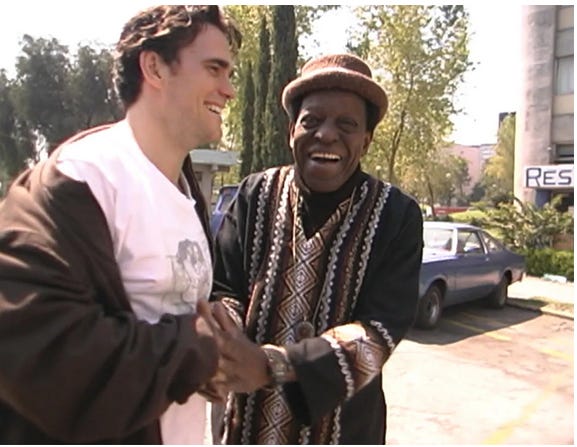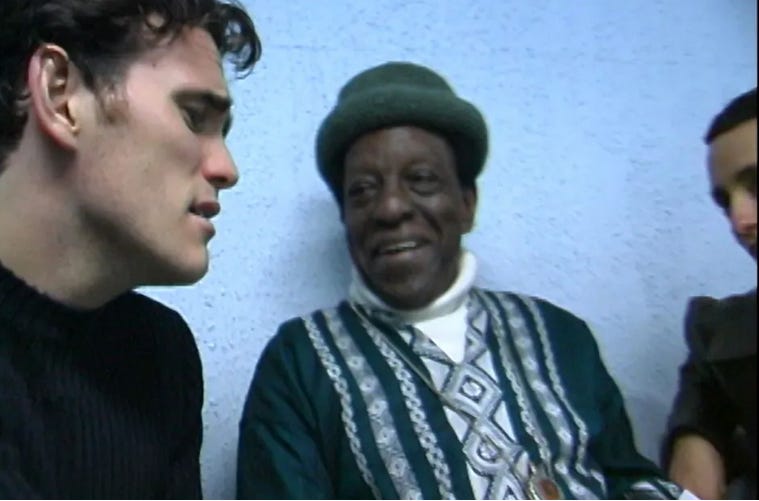Matt Dillon's Great Cuban Music Doc Has Still Not Been Released!!??
At least we have the music.
Matt Dillon’s documentary El Gran Fellove, about the pioneering Cuban scat singer and unforgettable crazy cat of the same name, and the actor/director’s own love of Cuban music, was two decades in the making. So, like others who had long been awaiting its release, I was thrilled when it made a round of festivals in 2020. I was lucky enough to screen this very charming and truly revealing movie about Francisco Fellove, the master of Cuban funk whose musical stylings are still, since his passing in 2013, being embraced by younger artists. The doc also tells the little-known story of the other Afro-Cuban musicians who left the island to find more open-minded opportunities in Mexico City in the 1940s and fifties. And as the narrator of the film that he directed, Dillon opens a window to his own experiences as a music nerd who got into albums by Joe Cuba and Eddie Palmieri, and later began crate digging in Havana and playing a set of lovingly worn congas.
There’s a Cuba on Record connection too - Fellove makes an uncredited appearance on the Panart Cuban Jam Session Vol. 1 album.
The disappointment is that, four years later, the movie that captured the meeting of El Gran Fellove and El Gran Mateo (as Fellove referred to Dillon) has still not been commercially released. Nope, it is not available on any platform. A producer close to the project tells me that music rights are the issue. I’m not privy to what the bone is exactly, but I’m annoyed that this film can’t reach its audience and others who have no idea who Fellove is, but I’m sure would be happy to. (And yes people, it’s Matt Dillon? Some name recognition for audiences there. Hello? Make it possible to release this man’s passion project.)
I’ll keep writing about it anyway. You can see a couple of trailers below.
And further down you can listen to the last album recorded by Fellove, produced by Joey Altruda, which will give you a good idea of why you’d like to see this documentary and find out more.
Meanwhile, you can read about the docu in a story that I wrote for Billboard back when the release of El Gran Fellove seemed like it was going to be a post-Pandemic gift, and I did a rather long phone interview with Dillon. (Hey Matt, thanks again for that conversation.) It’s posted down below here after the videos and music.
Matt Dillon Talks ‘El Gran Fellove’ and Love For Cuban Music: Exclusive [Billboard 9/23/2020]
Matt Dillon’s new documentary, 'El Gran Fellove,' spotlights the untold story of the pioneering Cuban scat singer, songwriter and tropical soul man Francisco Fellove.
Matt Dillon’s new documentary, El Gran Fellove, spotlights the untold story of pioneering Cuban scat singer, songwriter and tropical soul man Francisco Fellove. Dillon describes the charismatic showman’s sound as “sheer exuberance and joy.”
“Fellove had a larger-than-life quality when he was singing,” Dillon says during a phone interview from Rome. “He was not about to let anything stop him from letting that joy and that music out.”
El Gran Fellove, which had its world premiere Sept. 22 [2020] at the San Sebastian festival in Spain, was two decades in the making. Dillon first started filming Fellove in action in a Mexico City studio in 1999, where Los Angeles-based musician and producer Joey Altruda was recording an album with the then 77-year-old singer, who had not made a record in 20 years.
El Gran Fellove is full of feel-good moments. When, in the movie, recording starts in the studio, he has no idea who Matt Dillon is. But he is soon riffing about his new friend, at one point christening him “El Gran Mateo.”
Dillon builds an emotional connection to Fellove that deepens as we see the singer struggling to muster his former mojo. It’s later revealed, sadly, that the finished album was never released in his lifetime; Fellove died in Mexico City in 2013.
But El Gran Fellove revives his legacy and also introduces him to generations that never knew his music. Dillon’s second outing as a director (after the 2002 feature City of Ghosts), El Gran Fellove is a testimony to his own deep connection to Cuban music and musicians, and what he calls his “archeological” interest in the music’s history and context. “Once I started to listen to Afro-Cuban music, there wasn’t anything else I was interested in for a long time,” he says. “And I say Afro-Cuban music, but it started with New York Puerto Rican records like Joe Cuba and Charlie Palmieri. And then it’s such a broad spectrum, there’s so much great music. And that’s how I got here.”
Dillon researched the life and times of the Cuban artist through numerous interviews and archival footage, tracing his journey from his rumba roots in Havana’s Afro-Cuban Colón neighborhood to his place at the center of Cuban jazz jams in the late ’40s and ’50s.
“He was a real innovator early on,” Dillon says. “His style of performing was very modern, influenced by jazz. The music was very Cuban, very playful, and yet it was very, very jazzy.”
As reflected in the film, Fellove was among the many Afro-Cuban musicians who, by the mid-’50s, had left the island to ignite their careers in Mexican nightclubs and movies, at a time when, as one artist told Dillon, if you were working in television in Cuba and you were Black, you were more likely to be sweeping the floors than to be performing in front of the camera.
Fellove was at the top of his game in Mexico in the late ‘50s and early ‘60s. Then the tide turned.
“When rock ‘n roll starts to come in, all of the people playing the kind of music that he was doing, orchestras and Afro-Cuban music, they call it tropical music in Mexico, they all were being challenged,” Dillon explains. “It was rock and The Beatles that changed everything.”
“I’d just go through the bins and these records were in terrible shape,” he says, recalling his visits to a Havana record stall in the country’s post-Soviet years. “And I would look on the label, and if it said son montuno or mambo, then I would jump on it.”
“I’d just go through the bins and these records were in terrible shape,” he says, recalling his visits to a Havana record stall in the country’s post-Soviet years. “And I would look on the label, and if it said son montuno or mambo, then I would jump on it.”
Tipped off to Fellove’s music, he listened to his best-known composition “Mango Mangue,” which was covered by Machito and Celia Cruz, among others, and his signature song “El Jamaiquino,”by the avant-garde tres player Niño Rivera. “I just loved it, I didn’t question it, it’s a feeling you have right away,” Dillon says. “It was that voice, he had this incredible voice. He immediately went right into the top-tier category of all the music I love, like Arsenio Rodríguez and Beny Moré and René Alvarez; he was right up there at the top. This guy was great, and I needed to know more about him and what he was doing.”
He shared Fellove’s songs with Altruda, a friend with whom he often swapped mixtapes of latest finds. Altruda, who can be seen swinging and playing upright bass in the movie alongside Fellove, and who is a co-producer of the film, has recorded with international greats including Mongo Santamaría and Ernest Ranglin. When Dillon discovered through a DJ that Fellove was alive and living in Mexico City, Altruda contacted him about making an album. [Altruda explained that the record was orphaned when he lost his recording contract; he released it on Avocaudio in 2023 - listen above.]
As for Dillon and the documentary, it took a while. But, it was worth it. “I knew it was amazing to capture someone like him, someone who’s really something special when he walks in the room,” Dillon says. “[At first] I didn’t know what it was as far as a story. But as the years went on, I never gave up on the project.”







I’ve been waiting for this to be released for some time. Wasn’t sure what the delay was but your point on rights makes complete sense. Really hoping something comes of this and it gets to be shared with the world.
Wow, i would love to screen this doc at my film festival next year, just by reading your article alone